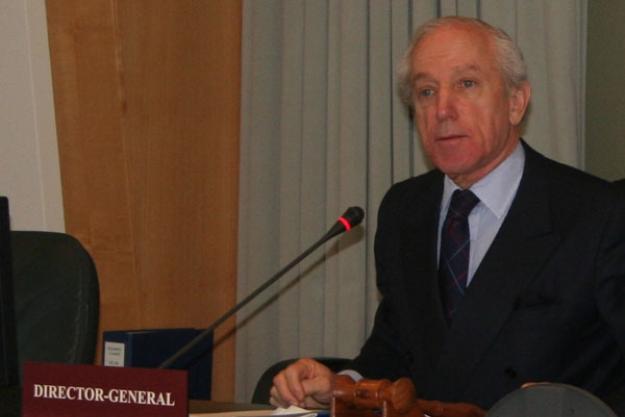
OPCW Director-General Ambassador Rogelio Pfirter
The year has started very positively for the OPCW, with two new States Parties having joined the Chemical Weapons Convention. This brings the number of States Parties to this very successful Convention to 186. We had all greeted Lebanon at the Conference of the States Parties at its Thirteenth Session this past December. It gives me great pleasure today to extend a warm welcome to Iraq as the newest Member State of the OPCW.
The following are excerpts from the statement. Read the full statement.
The remarkable progress towards attaining universality of the Convention is an important indicator of its success. But we all know that there remain a number of other challenges. Those challenges call for unity of purpose and concerted action. I personally, and the Technical Secretariat, would like to reassure delegations that we remain firmly and actively committed to continuing to strive to preserve the constructive spirit of compromise and consensus that has made the OPCW multilateral experience so unique and exemplary. This goal, at the same time, must remain a shared one and each of us must convincingly and untiringly contribute towards achieving it.
Chemical demilitarisation and verification
States Parties that have declared chemical weapons are moving steadily towards the goal of complete destruction of their stockpiles. In this respect, as at 31 January 2009, OPCW inspectors had verified the destruction of 29,741 metric tonnes of Category 1 chemical weapons, or 42.76%, of the total stockpiles declared by six possessor States. The amount of Category 2 chemical weapons destroyed remained unchanged at 915 metric tonnes (or 51.8% of the total declared).
Industry inspections
Allow me to turn now to Article VI inspections. Sixty-seven inspections have been completed since the Fifty-Fourth Session of the Council, which include: two at Schedule 1 facilities; 10 at Schedule 2 plant sites, of which two were with sampling and analysis; eight at Schedule 3 plant sites; and 47 at other chemical production facilities.
Assistance and Protection
During the intersessional period, an advanced and a basic course for the Secretariat’s Assistance Coordination and Assessment Team (ACAT) were held from 27 to 30 October 2008 and from 11 to 13 February 2009, respectively, with the financial support of the United Kingdom of Great Britain and Northern Ireland.
International cooperation
During the reporting period, various activities have also been carried out in the area of international cooperation. You will no doubt recall the very successful one-day event for National Authorities that was organised on 1 December 2008 at the OPCW headquarters, at the request of, and with financial support from, the European Union (EU). The aim of the European Union-sponsored day was to promote an interactive workshop to assist National Authorities with capacity-building in relation to the implementation of the Convention, and to enhance their dialogue with the industry. More than 190 participants from 87 States Parties were present in the various activities organised on the occasion, which included legal workshops, industry panels, and presentations delivered during the plenary.
Implementation support
In the field of implementation support, during the reporting period the Technical Secretariat carried out eight implementation-support activities. These activities include a regional basic training course for National Authorities of Asian Countries and a subregional customs course for States Parties in the Gulf Cooperation Council (GCC) area, both of which were held in Doha, Qatar.
Implementation of Article VII
With the notification of the establishment of the Iraqi National Authority, and I congratulate Iraq for having done that on the very first day of entry into force of the Convention for it, the number of States Parties with a National Authority has increased to 178. One additional State Party, Azerbaijan, has informed the Secretariat that it has legislation in place covering all key areas. This brings the number of States Parties that have fulfilled this requirement to 83. A further 43 States Parties have informed the OPCW that they have laws in place that cover some key areas.
Universality and external relations
As I mentioned earlier, Lebanon and Iraq joined the Convention, which entered into force for these two countries on, respectively, 20 December 2008 and 12 February 2009. Their accession represents an important advance in promoting universality as a factor for advancing peace and security in the region. Accession by these two countries brings us much closer to achieving a full global ban on chemical weapons. For its part, the Technical Secretariat stands ready to work with both countries in their efforts towards effectively implementing the Convention. In particular, we are ready to receive and act upon the declarations that Iraq will have to submit pursuant to the Convention within 30 days of entry into force and that will determine the steps to be taken both by this State Party and by the Technical Secretariat. I wish to underline here that the Secretariat is fully prepared to undertake any inspections that, in the light of Iraq’s forthcoming initial declaration, might be required in that country. Naturally, when the time comes for such inspections, as is the case in all the missions that we carry out, all pertinent considerations will be duly taken into account, including, of course, the priority question of the safety of the OPCW personnel.
